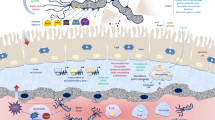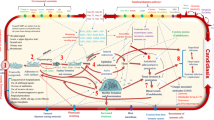Abstract.
Both innate immunity and mucosal surfaces provide the first line of defence against mucosal infections. Innate immunity is a universal and evolutionarily conserved form of host defence that senses microbial organisms. Recent advances in the field of immunology are due mainly to the discovery of the role of Toll-like receptors (TLRs), which recognize conserved microbial molecules. TLR stimulation induces specific patterns of gene expression that lead to the shaping of innate and adaptive immunity. Since mucosal tissues are colonized by innocuous microflora and challenged by infectious pathogens, activation of TLRs in epithelial and lamina propria cells must be tightly controlled to avoid inappropriate signalling that might lead to mucosal inflammation. This review aims to highlight novel insight on the molecules, pathways and gene expression networks associated with microbial recognition by TLRs and mucosal immunity.
Similar content being viewed by others
Author information
Authors and Affiliations
Corresponding author
Rights and permissions
About this article
Cite this article
Alexopoulou, L., Kontoyiannis, D. Intestinal epithelial barrier and mucosal immunity. CMLS, Cell. Mol. Life Sci. 62, 1349–1358 (2005). https://doi.org/10.1007/s00018-005-5039-x
Issue Date:
DOI: https://doi.org/10.1007/s00018-005-5039-x




